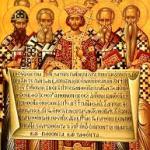Lectionary Reflections
Exodus 12:1-4, 11-14
March 28, 2013
When I was first ordained to the ministry over forty years ago, it was quite rare in my denomination to celebrate in a worship service on the Thursday of Holy Week. We Protestants left all that to our Catholic friends. And since I was first a minister in South Louisiana, there were more than enough Catholic friends to carry on their rites that evening while we Dissenters stayed at home. That fact is much changed over the years of my practice and observation. Now many churches, if not most, in United Methodism (and Presbyterianism, and Disciples of Christ, and United Churches of Christ, etc.) find themselves in church on Holy Thursday.
Just what do they think they are doing there on that night? The crowds tend to be small, the mood somber, the lights low, the organ soft. The traditional name of the night—Maundy Thursday—is perhaps a key, but an ambiguous one. Many assume that that peculiar name, Maundy, is a sort of loose rendering of the Latin, mandatum, "law/command." And filtering that Latin through Old French and Old English, we come to Maundy. Mandatum is the first word of the famous scene in John 13 where Jesus washes the feet of his disciples. And after he has done that, he announces in 13:34 "a new commandment, that you love one another." This connection, of course, is also why many Maundy evening worship services include an act of foot washing.
I was once asked on a graduate examination why I thought that foot washing had not become a regular service of Christian worship in the same way that communion had become regularized. After all, Jesus here gives a "new commandment," demonstrated in the act of foot washing. And in the middle of that act he says, "Unless I wash you, you have no share with me" (Jn. 13:8). I readily admit that I had no good answer to the question then and do not have a very good one now.
Foot washing in the Middle East during the time of Jesus was a very necessary and very menial act, usually performed by the meanest of slaves. The roads of the time were dusty, festooned with a wide variety of animal and human waste. Upon entering a house, the first act would be foot washing. As in the act of communion, where Jesus raises the common and simple meal of bread and wine to an act of worshipful celebration, so here in John 13 Jesus raises the common and simple task of foot washing to an act of worshipful and necessary celebration with his friends.
Hence, given this reading of the word, "Maundy" foot washing is a most appropriate way to celebrate the day. The act of caring for the most basic needs of our friends becomes thereby a symbol of our ongoing responsibility to care for all those in need, especially those whose feet need to be washed, those feet who carry them in their daily rounds of living, however sumptuously, however meagerly.
I admit freely that I internally cringe when I allow my feet to be washed, sometimes in this service by someone I hardly know. And I rather reluctantly offer that service to someone else's feet, those cracked and lined, those calloused and reddened by work, those carefully manicured and softened by salon and perfumed bath. I sometimes dread going to this service on Maundy Thursday. But after I have been, I just as often feel a tiny taste of what it means to serve even the least of these, as well as to be served.
But some do not think that the origin of the word Maundy is to be found in the Latin translation of John 13 at all. Some believe that the name Maundy is to be derived from the Old French "mendire"—"to beg." The practice of the king giving alms to the poor in the England of the Middle Ages, and beyond, is derived in this view from the Latin mendicare, "alms" or "gifts"—hence, the "mendicant friars" who survived by begging the gifts of the faithful. If the word is thought to mean that, the reason for the service can change significantly. Maundy Thursday then can become a special remembrance of the poor and the need for those who have resources to offer them to those who have less.
The Hebrew Bible lesson for the day, the institution of the celebration of the Passover in Egypt (Ex. 12), may perhaps appear at first blush to be a bit odd and out of place. In Exodus 11, Moses warns Pharaoh that the Egyptian firstborn are under threat from YHWH who demands that the people be freed from their bondage. And in Exodus 13, the firstborn of Egypt die, both human and animal. This dreadful tenth plague of Egypt finally persuades the recalcitrant pharaoh to let Israel go, though he later regrets his decision and chases after them into the desert, only to perish in the Sea of Reeds.
Right in the middle of this appalling slaughter of the firstborn, the editors of the book of Exodus pause to describe the continual need for a Passover to remind Israel, long after the acts of YHWH are dim in the memory, that YHWH has acted and will act on their behalf. The celebration is described in considerable detail, and many of the details are familiar to Jews to this day.





